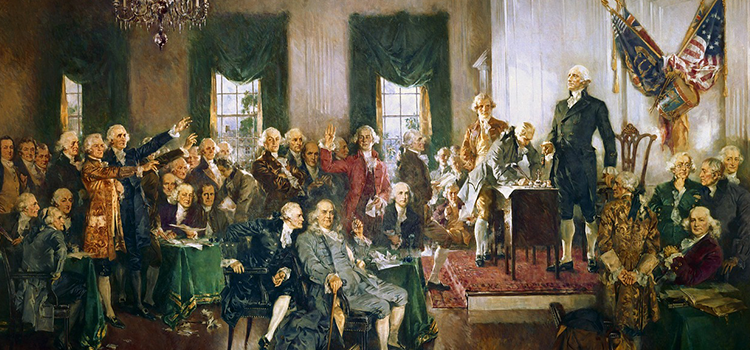Resisting Congressional Inquiries Under Barenblatt v. United States
Historical
In Barenblatt v. United States, 360 U.S. 109 (1959), the U.S. Supreme Court held that the House Committee on Un-American Activities did not violate the First Amendment in investing Lloyd Barenblatt’s affiliations with the Communist Party. Accordingly, it upheld Barenblatt’s conviction for contempt of Congress.
Facts of the Case
Summoned to testify before a Subcommittee of the House of Representatives Committee on Un-American Activities, which was investigating alleged Communist infiltration into the field of education, Lloyd Barenblatt, formerly a graduate student and teaching fellow at the University of Michigan, refused to answer questions as to whether he was then or had ever been a member of the Communist Party. He disclaimed reliance upon the privilege against self-incrimination. Rather, Barenblatt objected generally to the right of the Subcommittee to inquire into his “political” and “religious” beliefs or any “other personal or private affairs” or “associational activities” under the First Amendment.
After refusing to testify, Barenblatt was convicted of violating 2 U.S.C. § 192 which makes it a misdemeanor for any person summoned as a witness by either House of Congress or a committee thereof to refuse to answer any question pertinent to the question under inquiry. Barenblatt was fined and sentenced to imprisonment for six months.
Majority Decision
The Court upheld the contempt conviction. “Having scrutinized this record, we cannot say that the unanimous panel of the Court of Appeals which first considered this case was wrong in concluding that ‘the primary purposes of the inquiry were in aid of legislative processes,’” John M. Harlan II wrote on behalf of the majority.
In reaching its decision, the majority further held that “where First Amendment rights are asserted to bar governmental interrogation, resolution of the issue involves a balancing of the competing private and public interests.” In this case, the majority concluded that the balance tipped in favor of the government. “That Congress has wide power to legislate in the field of Communist activity in this Country, and to conduct appropriate investigations in aid thereof, is hardly debatable. This power rests on the right of self-preservation, the ultimate value of any society.”
Dissent
Justice William J. Brennan dissented. “[N]o purpose for the investigation of Barenblatt is revealed by the record except exposure purely for the sake of exposure. This is not the purpose to which Barenblatt’s rights under the First Amendment can validly be subordinated,” he wrote. “An investigation in which the processes of law-making and law-evaluating are submerged entirely in exposure of individual behavior-in adjudication, of a sort, through the exposure process-is outside the constitutional pale of congressional inquiry.”
Justice Hugo Black authored a dissent, which was joined by Chief Justice Earl Warren and Justice William O. Douglas. Justice Black was critical of the majority’s balancing test. “I do not agree that laws directly abridging First Amendment freedoms can be justified by a balancing process,” he wrote. “The balancing test completely leaves out the real interest in Barenblatt’s silence, the interest of the people as a whole in being able to join organizations, advocate causes and make political ‘mistakes’ without later being subjected to governmental penalties for having dared to think for themselves.”
Previous Articles
SCOTUS Rules State Can’t Immunize Parties from Federal Civil Liability
by DONALD SCARINCI on January 29, 2026
In John Doe v. Dynamic Physical Therapy, LLC, 607 U.S. ____ (2025) the U.S. Supreme Court held that...
Supreme Court to Address Racial Discrimination in Jury Selection
by DONALD SCARINCI onWhile the U.S. Supreme Court has concluded oral arguments for the year, it continues to add cases t...
Supreme Court Halts Deployment of National Guard to Chicago
by DONALD SCARINCI on
In Trump v. Illinois, 607 U.S. ____ (2025), the U.S. Supreme Court refused to stay a district court...
The Amendments
-
Amendment1
- Establishment ClauseFree Exercise Clause
- Freedom of Speech
- Freedoms of Press
- Freedom of Assembly, and Petitition
-
Amendment2
- The Right to Bear Arms
-
Amendment4
- Unreasonable Searches and Seizures
-
Amendment5
- Due Process
- Eminent Domain
- Rights of Criminal Defendants
Preamble to the Bill of Rights
Congress of the United States begun and held at the City of New-York, on Wednesday the fourth of March, one thousand seven hundred and eighty nine.
THE Conventions of a number of the States, having at the time of their adopting the Constitution, expressed a desire, in order to prevent misconstruction or abuse of its powers, that further declaratory and restrictive clauses should be added: And as extending the ground of public confidence in the Government, will best ensure the beneficent ends of its institution.





